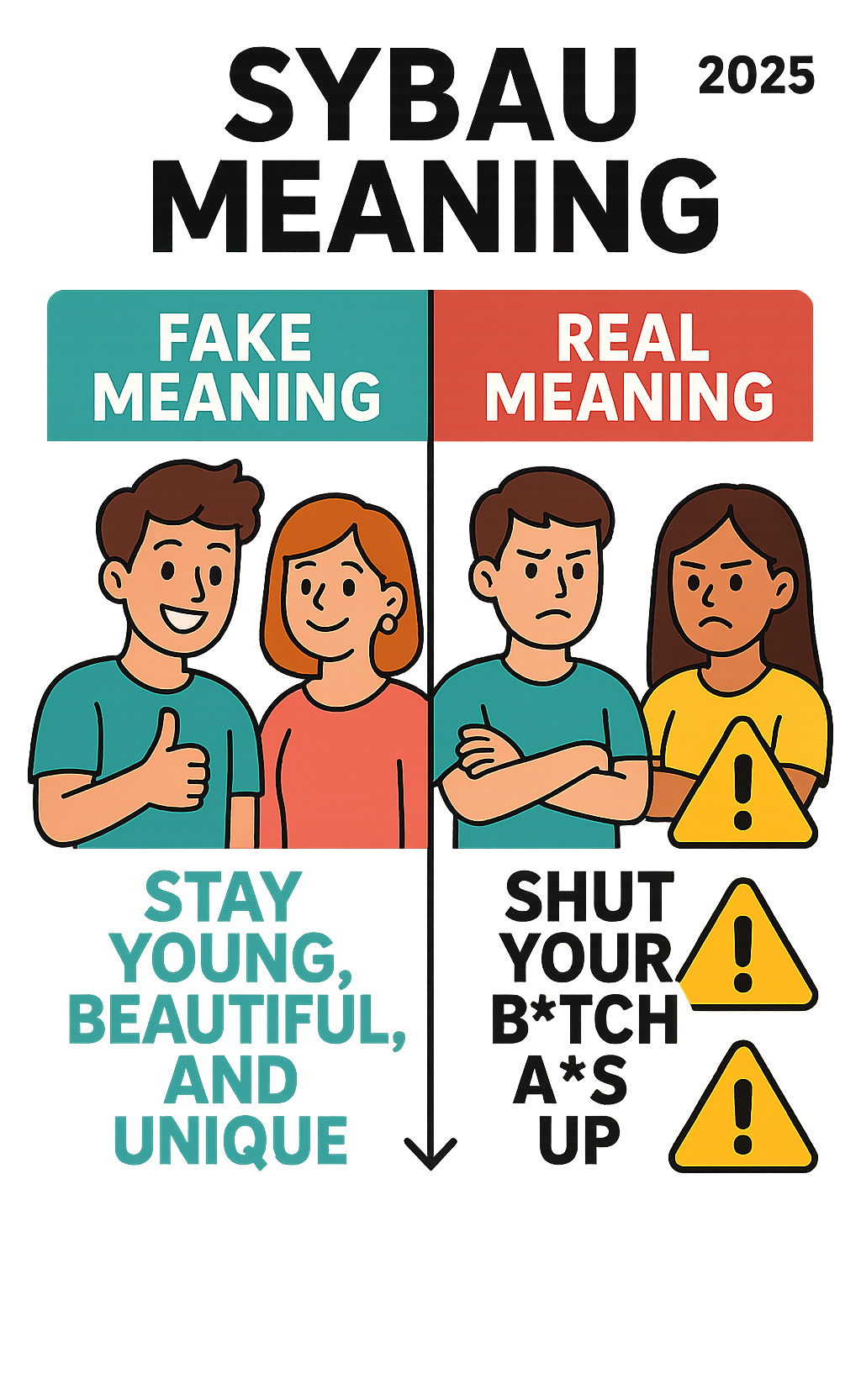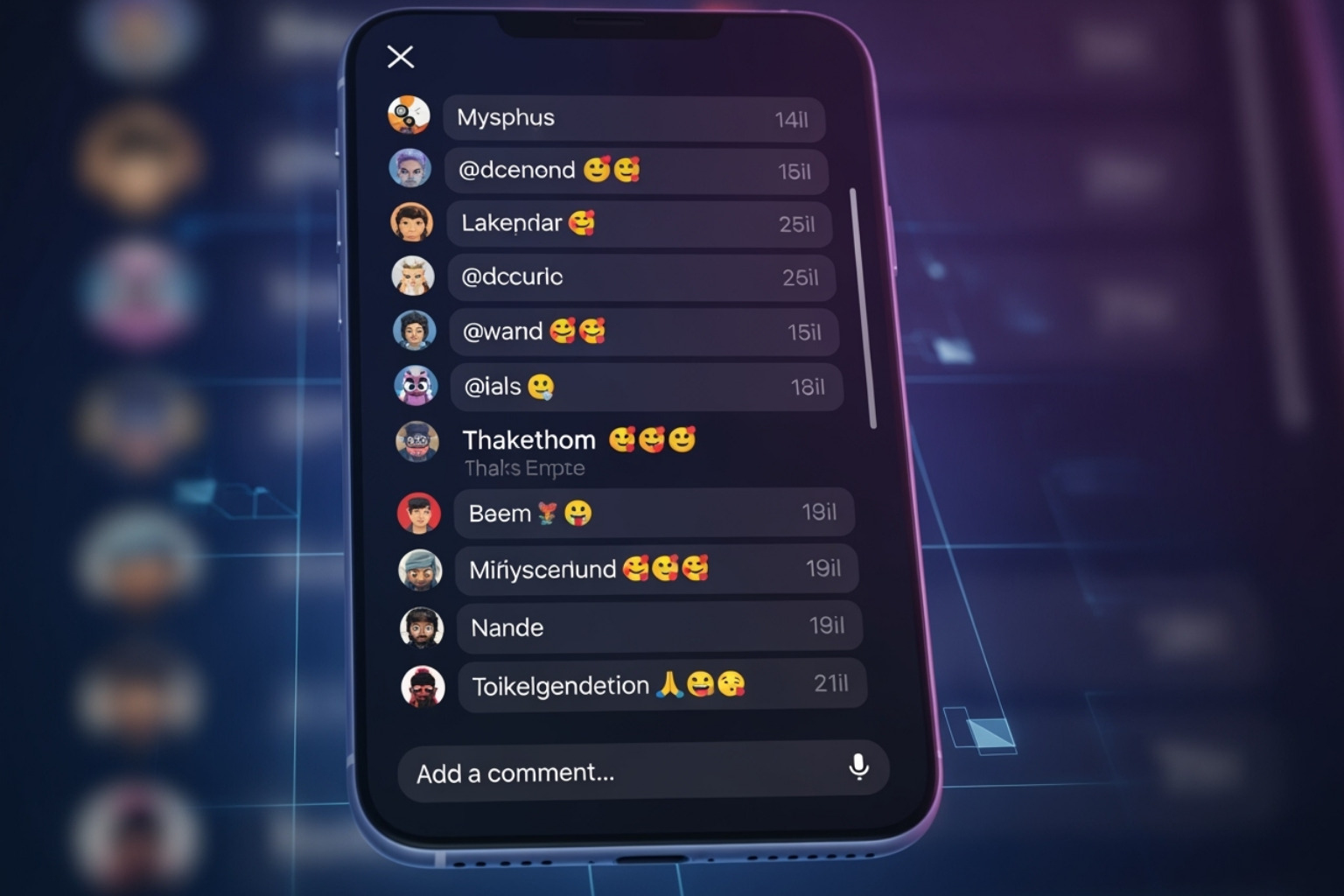Why Understanding SYBAU Matters for Parents and Adults
As a parent, you get used to decoding things—from school schedules to the latest food trends. But a new challenge has emerged from your teen’s phone: the sybau meaning. You might overhear it on public transit or see it in a group chat about meeting up at the local park. If you’re looking for a quick answer: SYBAU actually stands for “Shut Your Btch A Up”* – a vulgar phrase that many kids disguise by telling adults it means innocent things like “Stay Young, Beautiful, and Unique.”
Quick Answer: What Does SYBAU Mean?
- Real meaning: “Shut Your Btch A* Up” (vulgar/offensive)
- Fake meanings kids tell adults: “Stay Young, Beautiful, and Unique” or “Stay Young, Beautiful, and Unstoppable”
- Where it’s used: TikTok comments, text messages, online gaming
- Pronunciation: “see-bow,” “sigh-bow,” or “sea-brow”
This generational communication gap isn’t new. Kids have always had their own slang. But SYBAU represents something different. It’s not just harmless slang; it’s a deliberately deceptive term that encourages disrespectful communication while teaching young people to mislead the adults in their lives.
The rise of SYBAU on platforms like TikTok has created confusion for parents who find their children using what appears to be a positive, motivational phrase. The reality is far more concerning. When teens flood comment sections with false definitions or respond to parental texts with “SYBAU,” they’re participating in an inside joke that relies on adult ignorance.
Understanding what SYBAU really means—and why kids are motivated to hide its true definition—is crucial for maintaining open, honest communication with the young people in your life, especially in a world that moves as fast as ours.

* sybau meaning* vocab explained:
The Real Sybau Meaning and Its Vulgar Reality
In a world that values directness, you’d think communication would be straightforward. But when it comes to the sybau meaning, there are hidden layers, much like a secret password to a private club. Let’s cut to the chase: it means “Shut Your Btch A* Up.” There’s no sugarcoating it—it’s a deliberately vulgar and aggressive phrase wrapped in an innocent-looking acronym.
The harsh reality is that this term was designed to be offensive. When someone uses SYBAU, they’re essentially telling another person to shut up using the most disrespectful language possible. The phrase combines a derogatory slur with an aggressive command, creating something that’s meant to dominate and silence rather than communicate.
Why is SYBAU so problematic? Beyond the obvious vulgarity, this acronym normalizes hostile language. When teens casually throw around phrases like this—even as acronyms—it shapes how they think about respectful communication. What starts as internet slang can quickly bleed into real-world interactions on the bus or in school hallways.
The SYBAU entry on Urban Dictionary confirms this harsh definition, showing just how widespread this vulgar usage has become across social platforms.
The Deceptive Meanings Kids Use to Mislead Adults
Here’s where things get particularly concerning for parents. When adults find SYBAU in their teen’s messages and ask about it, they’re often fed completely false definitions. The most popular fake meanings include “Stay Young, Beautiful, and Unique” or “Stay Young, Beautiful, and Unstoppable.”
Some teens even offer variations like “Stay Young, Black, and Unique” when pressed for explanations. These wholesome-sounding alternatives are deliberately crafted to throw adults off the scent. It’s not just miscommunication; it’s an organized effort to mislead that feels particularly jarring in a culture that often prides itself on being upfront.
This deception has become an elaborate inside joke. Kids genuinely find it hilarious when adults believe these fake definitions. A TikTok video showing kids providing false answers perfectly captures this phenomenon—comment sections filled with teens perpetuating the lie while adults remain completely in the dark.
The sybau meaning deception has become so widespread that it’s created its own social dynamic. Teens who are “in the know” get to feel superior, while adults are left trusting what seems like a positive, motivational acronym.
Why the True sybau meaning is Problematic
The real sybau meaning creates problems that extend far beyond just using bad language. When young people regularly use such aggressive communication—even in acronym form—it fundamentally changes how they interact with others.
Words have real impact, even when they’re disguised as harmless letters. SYBAU teaches teens that it’s acceptable to tell people to shut up using the most offensive language possible, as long as it’s coded. This kind of communication style can easily escalate online conflicts and hurt relationships.
The deceptive element makes things even worse. When teens lie to adults about what their slang means, it breaks down the trust that healthy relationships require. Parents who find they’ve been misled often feel betrayed, making future conversations about digital behavior much more difficult.
The social context matters too. SYBAU isn’t just harmless rebellion; it’s part of a broader pattern where disrespectful communication gets normalized. When teens use this language casually in gaming chats, comment sections, and text messages, they’re practicing hostile communication patterns that can follow them into adult relationships.
Most concerning is the potential for real conflict. While teens might see SYBAU as an inside joke, adults and peers who understand its true meaning often find it genuinely offensive. This disconnect can lead to serious misunderstandings and damaged relationships, whether online or in person.
SYBAU in Action: How It’s Used on TikTok and in Texts

If you’ve ever wondered where exactly teens are using this mysterious term, the answer is everywhere in their digital world. The sybau meaning has found its home primarily on TikTok and in text messaging, where it spreads like wildfire. It’s become more than just slang; it’s a viral trend that creates an invisible line between those who know and those who don’t.
TikTok comments are ground zero for SYBAU usage. You’ll spot it under videos of a creator reviewing a new local pizza spot or ranking the best local food. It’s like watching a secret conversation happen in plain sight. The term has also made its way into text messaging, where kids use it as a quick, blunt response—often to unsuspecting parents who think they’re receiving something sweet and positive.
In online gaming, SYBAU serves as another weapon in the arsenal of competitive trash talk. The beauty of this generational code, from a teen’s perspective, is that it flies completely under the radar of most adults.
Common Scenarios and Examples of SYBAU
The most eye-opening way to understand SYBAU is to see how it plays out. Responding to parents has become a notorious use case. Picture this: a caring parent texts, “Be safe coming home on the bus tonight!” and gets back “SYBAU.” The parent might smile, thinking their teen sent something encouraging. This exact scenario went viral when a dad questioned his son about a SYBAU text, leading to an awkward conversation once the truth came out.
Commenting on videos is another popular use. Teens flood TikTok comment sections with SYBAU, sometimes as a reaction to what a creator said, other times just to participate in the inside joke. When adults ask for clarification, they often get those fake “Stay Young, Beautiful, and Unique” responses.
In-group banter among friends shows how the term functions as both playful aggression and a bonding ritual. Friends planning to meet at the mall might toss SYBAU back and forth when someone’s being dramatic. However, this casual use can easily cross lines, as seen when adults like the one in this frustrated rant about a SYBAU comment express genuine hurt once they find out what the term actually means.
The Social Implications of Using Coded Slang
Using coded slang like SYBAU creates fascinating social dynamics. For teenagers, it’s a powerful tool for building in-group identity. It’s their way of saying, “We’re in the know, and we understand something you don’t.”
But this sense of belonging comes at a cost: excluding others. When parents, teachers, or other adults encounter this term, they’re being shut out of the conversation. This creates a generational divide that can make meaningful communication much harder to achieve.
Perhaps most concerning is how teens use coded slang for testing boundaries. SYBAU represents a perfect low-risk rebellion—kids can use vulgar, disrespectful language right in front of adults without immediate consequences. It’s like getting away with something right under a parent’s nose, which adds to the thrill and feeling of shared culture among teens who are in on the joke.
The challenge for parents is recognizing that while this boundary-testing is normal, the deceptive nature of SYBAU raises important questions about honesty and respect.
A Parent’s Guide to Responding to SYBAU

Finding that your teen uses the sybau meaning in their texts can feel as jarring as getting a bad review for your favorite neighborhood diner. Your first instinct might be to react strongly, but as any seasoned parent knows, a calm approach is usually best.
Take a deep breath. Overreacting will likely slam the door on any meaningful conversation. Your teen will shut down, you’ll feel frustrated, and nothing gets resolved.
At The Dining Destination, our expertise is in navigating the complex culinary world, from a local food truck to a fine dining experience downtown. We believe that same principle of curious exploration applies here: open communication is everything. The goal isn’t just to ban the word. It’s to understand why your child is using it and guide them toward more respectful ways of expressing themselves.
This means getting curious instead of getting angry. It means asking questions rather than delivering lectures. And yes, it means setting clear boundaries while still maintaining the trust you’ve built with your teen.
How to Start the Conversation About the sybau meaning
Starting this conversation requires some finesse. Your teen might be genuinely shocked that you know what the sybau meaning really involves. They’ve probably gotten comfortable thinking adults are clueless about their digital language.
Begin with simple observation: “Hey, I noticed you used ‘SYBAU’ in a text the other day.” Keep your tone neutral—you’re gathering information, not launching an interrogation.
Express genuine curiosity: “Can you help me understand what that means? I’ve seen different definitions online, and I’d love to know what it means to you.” This approach shows respect for their perspective.
They’ll likely offer you one of those innocent definitions. Don’t pounce immediately. Listen first.
Then you can share your knowledge calmly: “That’s interesting. When I looked it up, I found it actually stands for ‘Shut Your Btch A* Up.’ Were you aware of that meaning?”
Explore their perspective without judgment: “Help me understand—why do you think kids use this term? What’s the appeal? Do you think everyone who sees it knows what it really means?”
The key is fostering trust rather than creating defensiveness. You want your teen to feel safe being honest with you, even when they’ve made questionable choices.
Setting Expectations for Respectful Digital Communication
Once you’ve had that initial conversation about the sybau meaning, it’s time to talk about the bigger picture. This isn’t just about one offensive acronym; it’s about helping your teen become a thoughtful digital citizen.
Family values matter, even in the digital space. Discuss how respect, kindness, and honesty remain important whether they’re talking face-to-face or through a screen.
Impact on others is crucial to address. Your teen might not realize that their “harmless joke” could hurt someone. Ask them to consider how they’d feel if someone used that language toward them or someone they care about. This isn’t about making them feel guilty; it’s about developing empathy.
Don’t forget to discuss school consequences. Many schools now monitor digital communication, and using offensive language can lead to real disciplinary action.
Digital citizenship extends far beyond your family’s kitchen table. Help your teen understand that their online presence follows them—to college applications, job interviews, and future relationships. The habits they build now matter.
The goal is helping them draw clear lines between playful communication and language that’s vulgar, deceptive, or disrespectful.
For more guidance on navigating these complex family conversations, check out our comprehensive family resource guides. We’re here to help you create the kind of open, honest dialogue that strengthens your family bonds.
Frequently Asked Questions about SYBAU and Similar Slang
How do you pronounce SYBAU?
Just like people can’t agree on how to pronounce certain words, there’s no single “official” way to pronounce the acronym behind the sybau meaning. Internet slang develops its own regional variations.
Most teens we’ve encountered seem to favor “see-bow”, though you’ll also hear “sigh-bow” quite frequently. Some even say “sea-brow,” which sounds like it could be a dish at a waterfront restaurant.
This lack of standardization is typical for internet slang. The terms spread so quickly that pronunciation becomes secondary to the written form. The important thing isn’t how your teen says it; it’s understanding what they actually mean.
What is the origin of SYBAU and are there similar terms?
The sybau meaning didn’t appear out of nowhere. Like so many trends that catch fire in cultural hubs, it exploded on TikTok and is part of a long family tree of dismissive acronyms.
Think of SYBAU as the newer, more elaborate cousin of STFU (Shut The Fck Up). There’s also SYAU (Shut Your Ass Up). What makes *SYBAU tricky is that it evolved specifically to be less recognizable to adults. While most parents caught onto STFU years ago, SYBAU was designed to fly under the radar. It’s like teens created their own secret recipe, adding extra ingredients to make it harder for adults to decode.
The pattern is clear: each generation of internet users creates more sophisticated ways to communicate without adult supervision. You can find ongoing discussions about these evolving terms on platforms like Reddit, where users discuss the term’s meaning, showing how these conversations develop in real-time.
What are the social implications of using SYBAU?
Using the sybau meaning in daily communication has ripple effects. For teenagers, dropping SYBAU is like having a VIP pass to an exclusive club—it signals they’re part of the in-group identity that “gets it.” It’s the linguistic equivalent of knowing about an amazing, unmarked local spot versus just going to a major tourist attraction.
But that VIP pass works by excluding others, particularly adults. It creates two different conversations: the surface level that adults hear and the hidden level that only teens understand.
The boundary-testing aspect is also key. Teens can use offensive language right in front of authority figures, and the “joke” is that the adults don’t realize they’re being insulted. It’s rebellion with a built-in safety net.
What concerns us most is how this normalizes deception. When kids routinely lie about what their words mean, it can erode trust. It’s like serving someone a dish while telling them it contains completely different ingredients—eventually, that breaks down trust around the dinner table.
The feeling of shared culture from coded slang is powerful for teens. But when that culture is built on disrespect, it can shape communication patterns that follow them into adulthood.
Conclusion
Navigating the sybau meaning is a bit like finding a new, complex dish on a menu—it can be intimidating at first, but understanding its ingredients is key. What started as a question about a mysterious acronym reveals a window into how young people create their own linguistic spaces and test boundaries.
The reality is that SYBAU isn’t just harmless slang. Its vulgar true meaning of “Shut Your Btch A* Up” and the deception surrounding it highlight a challenge for parents in the digital age. When kids mislead us with alternatives like “Stay Young, Beautiful, and Unique,” they’re creating distance in our relationships.
But this doesn’t have to be a source of fear. We’re surrounded by a vibrant mix of cultures and languages; teen slang is just another dialect in the modern soundscape. At The Dining Destination, we believe that curiosity is the best spice for any experience—whether you’re trying a new cuisine or a new conversation with your teen.
Digital literacy today is about understanding the social dynamics, hidden meanings, and real-world impact of online behavior. When we learn about terms like SYBAU, we show the young people in our lives that we care enough to meet them where they are.
The key is fostering open family dialogue without lecturing. Approaching these moments with curiosity and setting clear expectations for respectful communication can transform potential conflicts into opportunities for deeper connection.
Every generation has had its secret codes. What makes this moment unique is how quickly these terms spread. By staying informed and maintaining open communication, we can guide young people toward understanding the real power their words carry.
For more insights into navigating modern family life, we invite you to explore our full library of family resource guides. Just as we help food enthusiasts find authentic culinary experiences, we’re here to help you steer the ever-changing landscape of contemporary communication—one conversation at a time.







